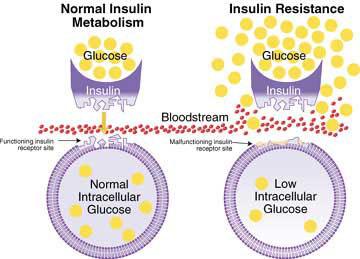Systemic insulin resistance can result from impaired insulin action in metabolically active organs and tissues, including skeletal muscle, the liver, and adipose tissue. The degree to which systemic insulin resistance is due to impaired insulin action in skeletal muscle, liver, or adipose tissue may vary among individuals. In this article, we will discuss metabolic syndrome, signs, symptoms, causes, and diet.
Prevalence of Metabolic Syndrome
Metabolic syndrome is a cluster of metabolic risk factors that can result in a myriad of cardiovascular events. These risk factors are high waist to hip circumference, high blood pressure, diabetes, and elevated cholesterol levels.
Metabolic syndrome is very high in African American and Hispanic women. Approximately 35% of Americans have metabolic syndrome. People diagnosed with metabolic syndrome has a 50% chance of getting diabetes and cardiovascular disease.
Scientists are not 100% sure of what causes metabolic syndrome, but the thought is that insulin is the culprit.
Insulin resistance and obesity are considered to play a big role. Obesity causes inflammation, and evidence shows that metabolic syndrome is an inflammatory state.
In fact, it is believed that inflammation plays a role. People diagnosed with metabolic syndrome has a 50% chance of getting diabetes and cardiovascular disease.

What Causes Metabolic Syndrome
Scientists are not 100% sure of what causes metabolic syndrome, but the thought is that insulin is the culprit.
Insulin resistance and obesity are considered to play a big role. Obesity causes inflammation, and evidence shows that metabolic syndrome is an inflammatory state.
In fact, it is believed that inflammation plays a role.
Signs and Symptoms of Metabolic Syndrome
- High blood sugar
- High blood pressure
- A large waistline
- PCOS
- Obstructive sleep apnea
- Type 2 diabetes
- Elevated triglycerides
- Non-alcoholic fatty liver disease
- Cancer
Risk Factors for Metabolic Syndrome
- Pregnancy
- Stress
- Poor diet
- Lack of physical activity
- Sleep deprivation
- Medications
Medications and Treatments for Metabolic Syndrome
- Metformin– Metformin is a diabetic agent that Helps your body utilize insulin. High Insulin levels are known to contribute to metabolic syndrome. Therefore, doctors have been using Metformin with good success. However, there are some side effects of Metformin such as G.I. distress and decreasing B12 levels. It is imperative that your doctor check your B12 levels with this medication
- Actos -This medication prevents diabetes in people with insulin resistance. Actos increases insulin sensitivity by activating insulin receptors.
- Spironolactone– could improve glucose homeostasis by restoring insulin secretion in subjects with metabolic syndrome
Natural Treatments for Metabolic Syndrome
Insulin resistance is a condition where the body’s cells become less responsive to the effects of insulin, leading to elevated blood sugar levels. While medical treatment and lifestyle changes are often recommended for managing insulin resistance, some natural treatments may also be beneficial. Here are a few natural approaches that may help improve insulin resistance:
-
Diet: Following a healthy, balanced diet can have a positive impact on insulin resistance. Some dietary recommendations include:
Consuming whole foods: Opt for whole grains, fruits, vegetables, and lean proteins, while limiting processed foods, sugary beverages, and refined carbohydrates.- Including healthy fats: Incorporate sources of healthy fats like avocados, nuts, seeds, and olive oil into your diet.
- Balancing macronutrients: Aim for a balanced intake of carbohydrates, proteins, and fats to regulate blood sugar levels.
- Avoiding excessive calorie intake: Maintain a healthy weight and avoid overeating to prevent further insulin resistance.
-
Regular exercise: Physical activity helps increase insulin sensitivity and improve glucose metabolism. Engage in aerobic exercises, such as brisk walking, jogging, or cycling, for at least 150 minutes per week. Strength training exercises can also be beneficial in building muscle mass and enhancing insulin sensitivity.
-
Weight management: Maintaining a healthy weight or losing excess weight can significantly improve insulin resistance. Combining a balanced diet with regular exercise can help achieve and maintain a healthy body weight.
-
Stress reduction: Chronic stress can contribute to insulin resistance. Incorporate stress reduction techniques into your routine, such as meditation, deep breathing exercises, yoga, or engaging in hobbies that help you relax.
-
Adequate sleep: Poor sleep quality or insufficient sleep can disrupt hormonal balance and increase the risk of insulin resistance. Aim for 7-9 hours of quality sleep each night.
-
Herbal supplements: Some herbal supplements have been suggested to have potential benefits for insulin resistance. However, it’s important to consult with a healthcare professional before taking any herbal supplements, as they can interact with medications or have side effects. Examples of herbs that have been studied for their potential benefits include cinnamon, berberine, and fenugreek.
Remember, these natural treatments can support your overall health and may help improve insulin resistance, but they should not replace medical advice or prescribed treatments. It’s always best to consult with a healthcare professional before making significant changes to your treatment plan.
More Natural Treatments
- Coconut oil – Coconut oil has properties that are known to decrease insulin resistance. The lauric acid which is an ingredient in coconut oil has these properties.
- Spearmint tea – This tea has anti-androgenic properties and it has been shown to help with some of the signs and symptoms of metabolic syndrome in women such as facial hair.
- Low-carb high-fat diet-For me, this has been the most helpful in treating my diagnoses of metabolic syndrome. There are many forms of low-carb high-protein diet such as Atkins, Mediterranean, Banting, etc. I have always lost weight on this diet, especially in my midsection. Also, my blood work always shows improvement in my cholesterol and insulin levels. This is a very easy diet to follow. If you cut out sugar, white foods, bread, and starchy vegetables, this diet will work its magic.
- Exercise- Exercise along with a low carb diet high protein diet is the top two solutions for metabolic syndrome.
- Chromium – Chromium is an important component of the human diet. The food and drug administration proposes a dietary intake of 130 micrograms per day. Chromium is known to have a beneficial role in the regulation of insulin and its effects on carbohydrate and lipid metabolism. Studies have shown that people who have insulin resistance and diabetes have a lower level of chromium. Dietary chromium is poorly absorbed, therefore people should take supplements. Chromium picolinate 1000 µg a day has been found to improve blood glucose control.
- Weight loss/keto diet – Weight loss and a low-carb diet have been shown to help decrease the symptoms of insulin resistance.
Conclusion
Metabolic syndrome is a very serious disorder. Metabolic syndrome is associated with insulin resistance, heart disease, obesity, and stroke. Although there is no cure, metabolic syndrome can be controlled.
My name is Phyllis Robinson MSN, RN. I have been a Registered Nurse for 27 years in the Cardiac Intensive Care Unit. I am passionate about cardiac care and heart disease. I also want this blog to be an educational tool that people can refer to for traditional and alternative treatment. I will blog on heart disorders such as high blood pressure, congestive heart failure, cardiomyopathy, and high cholesterol.
I received my Nursing degree from Baltimore Community College.
I went on to receive my Masters in Nursing from Walden University
I have worked for almost 30 years in Critical Care with a focus on heart health. I am an advocate of preventive healthcare.



Very informative! Thank you 🙂
My husband had a heart attack and had a surgery to replace a valve last year. We are still learning all we can about heart disease and we have made a lot of changes in our diet and lifestyle. Thank you so much for this information!
Nice concise article. I found that liquid chromium works wonders to lower blood sugar levels and it is easy to use – just add several drops to any drink. I even use it with my animals as now pets are becoming obese. No surprise since their food is processed the same way as human food, and contain lots of inexpensive grains.
I have also had great success with intermittent fasting. It allows the body to reduce the levels of free insulin which can reduce sugar cravings. The best part is that you can control how long you fast (12 hours is a good start) and how often. Thank you for your blog.
Thank you for the comment😊. Yes chromium is also wonderful.